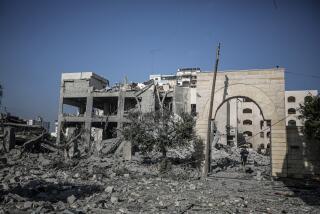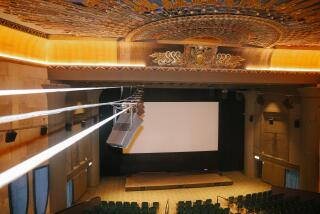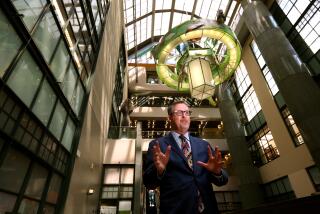In Egypt, a Bastion of Learning Rises From the Ashes of History
- Share via
ALEXANDRIA, Egypt — More than a millennium after it was sacked and burned in an era of religious fanaticism, Alexandria’s library has risen again on the Mediterranean shore -- a reminder, as President Hosni Mubarak put it, that “cultural dialogue must be a substitute for violence in a world torn by conflict.”
The reopening of the library, once the world’s greatest repository of scrolls and knowledge, marked the completion of a 20-year, $200-million project. Ceremonies held Oct. 16 were attended by Mubarak, the presidents of France, Italy and Greece, the queens of Jordan, Sweden and Spain, 14 Nobel laureates and a choir of children who performed Beethoven’s Ninth Symphony in Arabic.
The reopening came as Egypt and its Arab neighbors are again confronting the threat of religious zealotry. This time, however, the fanatics are Muslims, rather than the Christians who attacked the library as a pagan institute and killed its last great scholar, Hypatia, a philosopher and mathematician, in AD 415. Despite fires and sackings over several hundred years, parts of the collection survived for centuries.
Egyptians hope the new high-tech, computer-laden Bibliotheca Alexandrina will kindle a cultural revival in a country where the educational system is in tatters and 49% of people age 15 and over are illiterate. Plans are afoot to hold international seminars on global issues at the library and to build its collection -- now 250,000 books -- to 8 million volumes.
The original structure attracted scholars such as Archimedes, Eratosthenes and Euclid in ancient times. It is where the Old Testament was first translated from Hebrew to Greek.
But there are concerns that today’s environment -- Egypt has tight censorship, and Islamic extremists show little tolerance in many matters of modernity -- will hinder a diverse acquisition of books, thus limiting the library’s usefulness as a center for research and learning. Egypt’s Nobel laureate in literature, Naguib Mahfouz, was stabbed in the neck by a militant in 1994 after the religious establishment labeled one of his novels blasphemous. And nowhere in Alexandria or Cairo does one find books perceived as critical of Egyptian foreign policy or Mubarak or Islam, such as Salman Rushdie’s novel “The Satanic Verses.”
“You won’t find my books in the Alexandria library either, and I’m not sure you ever will,” said Nawal Saadawi, a militant feminist and sometime government critic. Many of her 27 books deal with women and sexuality, a sensitive subject in the Muslim world.
David Wardrop, who founded UK Friends of the Alexandria Library and has advised officials on acquisitions, said that censorship is a concern but that the significance of Bibliotheca Alexandrina goes beyond its role as a library. Otherwise, he said, it would not have received the support and financial backing of UNESCO, the U.N. cultural organization, as well as governments, scholars and human rights advocates from throughout the world.
He and other international supporters have challenged the government to use the facility to reintroduce the concept of democratic dialogue to Egypt.
“This is an opportunity for them to use the library as a sort of Hyde Park, where they can voice their opinions in freedom,” he said, referring to the park in London noted for the public discussions of current issues that take place there.
Wardrop’s organization has presented Bibliotheca Alexandrina with microfiche copies of 14,000 Arabic manuscripts from the British Library.
“We are continuing to press the ‘Bibalex’ to stage events and symposiums which couldn’t be staged elsewhere in the Middle East,” he said. This is where issues such as Mahfouz’s criticized novel and the absence of Saadawi’s books could be raised and debated, he added.
The 11-story library, designed by the Norwegian architectural firm Snohetta, is striking in appearance. It rises from the ground like a giant disc tilted toward the sea. Its reading room is as big as New York’s Grand Central terminal. It has a conference center, planetarium, museum space, 300 Internet-connected computers and a computerized card catalog. The largest and most advanced complex of its kind in the Arab world, it has already become a major attraction in this city established by Alexander the Great in 332 BC.
Whatever its future as a center of learning, the resurrected library became an important symbol the day it opened to a region clouded by strife, poverty and uncertainty. It stood as a celebration of humanity’s shared heritage and was, Mubarak said at the inauguration, “a call to terminate violence, tension and all sorts of terrorism.”
More to Read
Sign up for Essential California
The most important California stories and recommendations in your inbox every morning.
You may occasionally receive promotional content from the Los Angeles Times.













